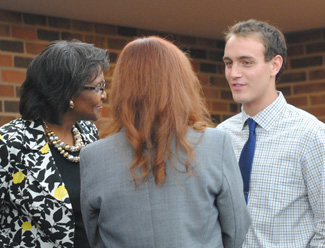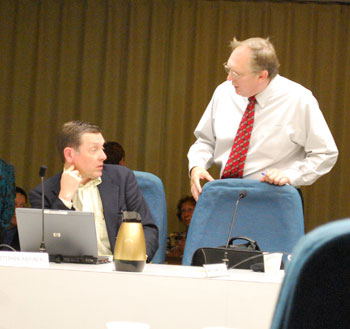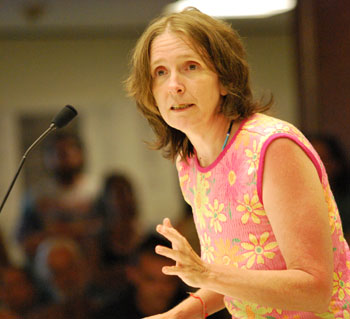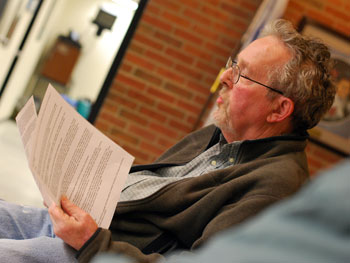UM Regents Updated: Research, Renovations
University of Michigan Board of Regents meeting (Sept. 16, 2010): This month’s public meeting of the regents lasted just over an hour and included some unusual elements, along with the usual fare.

Chris Armstrong, right, president of the Michigan Student Assembly, talks with Royster Harper and Kelly Cunningham before the Sept. 16 UM Board of Regents meeting. Harper is vice president for student affairs. Cunningham is director of UM's Office of Public Affairs. (Photos by the writer)
Board chair Julia Darlow read a brief statement near the start of the meeting, stating support for anyone in the university community who comes under attack for their identity – an oblique reference to what’s been characterized as the cyber-bullying of Chris Armstrong, the Michigan Student Assembly president. Armstrong, who is gay, is the target of the “Chris Armstrong Watch” blog, maintained by Andrew Shirvell, a state assistant attorney general.
Later in the meeting during his regular report on MSA activities, Armstrong criticized the Ann Arbor city council for its recent proposal to ban porch couches, noting that although he planned to meet with some councilmembers later that day, they had not consulted students before taking action on the issue. At their Sept. 20 meeting, council is expected to vote on an ordinance amendment to ban upholstered furniture on porches.
Also during Thursday’s meeting, regents approved renovations and upgrades for several facilities on campus. The vote for a high-profile project to add permanent night lighting at Michigan Stadium passed without comment, while a seemingly innocuous elevator replacement at South Quad yielded an uncharacteristic, albeit relatively brief, discussion about long-term planning for the renovation of that dorm.
Regents heard a presentation about the research work being done at UM’s Institute for Social Research, given by ISR’s director, James Jackson. They also heard from Stephen Forrest, UM’s vice president for research, that the university had for a second year passed the $1 billion mark in research expenditures for fiscal 2009-10, increasing 12% over the previous year.
Not faring as well are donations to the university. Jerry May, vice president for development, reported that contributions dropped 4% to $254 million during 2009-10, which ended June. 30. However, there was an uptick in the last half of that fiscal year and the first two months of this year, which May described as “very healthy.”
The meeting concluded with one speaker during public commentary. Douglas Smith criticized regents Andrew Richner and Andrea Fischer Newman for, among other things, failing to deliver on a campaign promise to hold tuition increases to the rate of inflation. Noting that the two Republicans were running for re-election, he urged the public to vote against them in November. After his remarks, three of the Democrats on the board came to the two Republicans’ defense. [Full Story]






